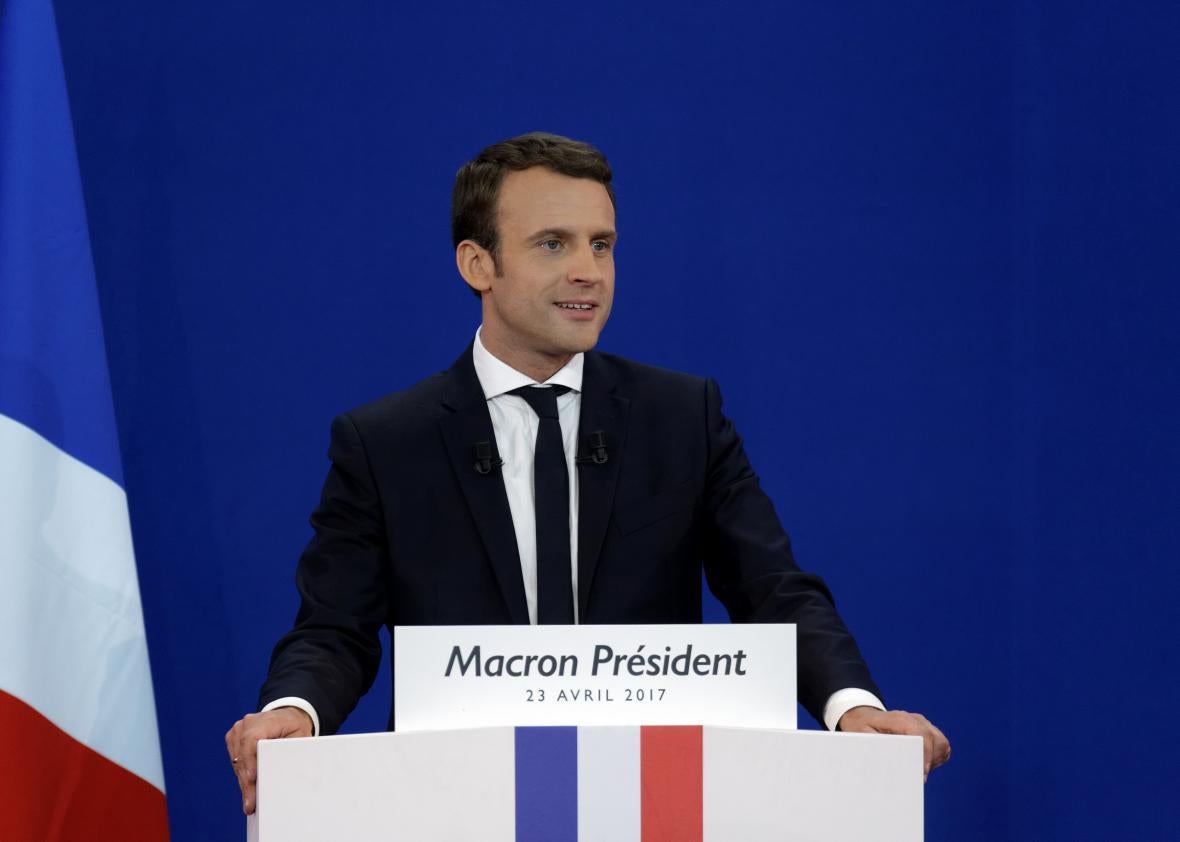The results of the first round of the French election on Sunday were, to be sure, a rebuke of the country’s political elite. For the first time ever, neither of France’s two main political parties, the center-left Socialists and the center-right Republicans, will have a candidate in the second round runoff. Republican candidate François Fillon only barely hung on to third place over the hard-left Jean-Luc Mélenchon, while Benoît Hamon—the candidate from current president Francois Hollande’s Socialist party—finished fifth with an embarrassing 6 percent of the vote.
But despite the direct rejection of the French political class—and barring an upset victory by Marine Le Pen that would make the election of Donald Trump and Brexit pale in comparison—the next president of France is still likely to be Emmanuel Macron, a technocratic former investment banker turned cabinet minister with a strikingly modest platform for reform. French voters were so desperate to reject the status quo, they ended up preserving it.
Macron’s platform has a little something for everyone. While he talks a big game as a free-market reformer who wants to modernize the French economy and cut corporate taxes, he has also promised not to touch sacred cows like France’s 35-hour work week or retirement age of 60. He wants a common European policy for countries to share the burden of immigration, no further restrictions on headscarves or other Islamic religious symbols, an increase in military spending to the NATO-mandated 2 percent, and wants more and stronger European integration (Donald Trump will be happy on the NATO score and probably take credit).
It’s striking that in an election where the Socialists moved far to the left to compete with Mélenchon and the Republicans went far right to counter the National Front, the strategy that worked in the end was a straight-down-the-middle embrace of the status quo presented with a younger, more dynamic appearing package. (One former colleague referred to Macron as “the French Bill Clinton, 25 years later.”) Macron’s campaign initially took off when his center-right rival Fançois Fillon, the initial front-runner, was beset by a criminal investigation. He has also benefited from (at least apparently) being squeaky clean, though a more cynical read on that might be that he hasn’t been in French politics long enough to get his hands dirty—he’s never been elected to any office before, served as economy minister for just two years, and just last year founded his own party En Marche—which shares his initials—specifically to run for president.
French voter discontent is real, but it seems as if none of the ideological candidates, spanning from the far-right to far-left, were able to sell voters on their vision of change. More than anything else, a vote for Macron seems like a vote for “none of the above.” He’s just unobjectionable enough that a majority of voters are likely to pick him over Le Pen—whose extreme views on immigration and Islam elicit somewhat stronger reactions to say the least.
While it worked this time around, the “none of the above” strategy doesn’t seem like a longterm solution for France or any other country in Europe. Sooner or later, a leader is going to have to grapple with the tough questions of how to define French identity in a more multicultural era, how to make the economy more competitive and provide opportunities for young people without sacrificing core social economic values, and figure out a vision for the future of Europe that’s actually appealing to Europeans. If they don’t, the far-right—which certainly claims to have simple answers to these problems—will eventually figure out a way past its runoff problem and finally translate its popularity into some actual electoral success. We just need to look to our own country to see how that can work.
Bland, technocratic Macronism doesn’t seem like the answer to an international wave of economic nationalism and nativism. It will have to do, for now at least, in France.
